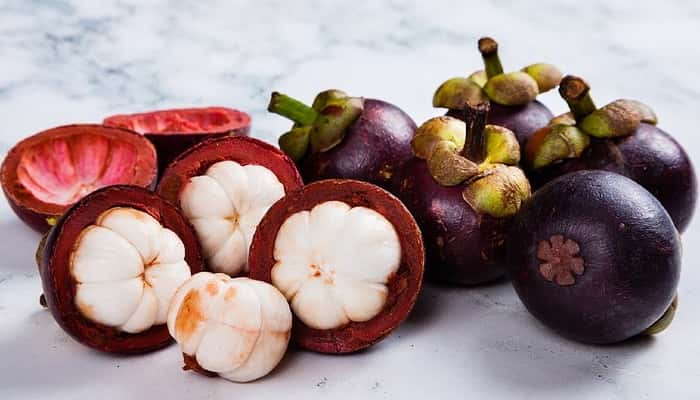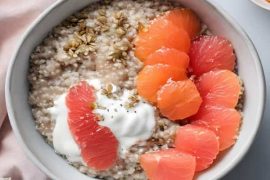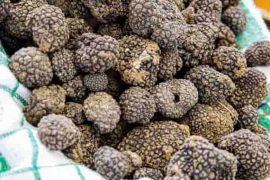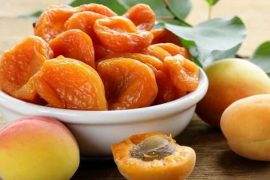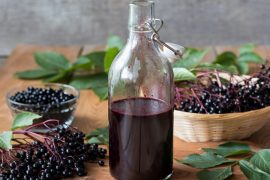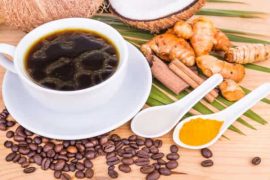Зміст
The leader in the production of mangosteen (Garcinia mangostana L.) is the tropical country of Thailand. The tree grows quite slowly and bears fruit in 8–10 years. The taste of mangosteen is compared to manna from heaven; it is simply impossible to convey in words the organoleptic qualities of this fruit. It has many health benefits. Strong antioxidants that support the immune and nervous systems, skin condition, metabolism, but, above all, have anti-inflammatory, anti-allergic and antiparasitic properties. Coenzyme Q10 is also a valuable ingredient in this plant that affects many disease conditions and helps in the body’s detoxification process of harmful substances from the environment.
What does mangosteen look and taste like?
The mangosteen tree is evergreen with olive-colored leaves and can reach 25 meters in height. The time that must pass for a tree to begin to bear fruit is more than 8–10 years. Mangosteen fruits are round, ranging in size from 4 to 7 cm. It is segmented in the same way as oranges. The skin of the fruit is quite thick and inedible, dark purple in color, and the flesh is white.
The pulp of the fruit is soft with seeds, white, tender and juicy. The taste of mangosteen is described as sweet and very refreshing. Similar to pineapple, apricot or orange, and sometimes even sweet gooseberry. Chefs recommend eating mangosteen fruits raw, served in half the peel and hollowed out with a spoon.
What are the properties of mangosteen?
The multifaceted effects of mangosteen’s active ingredients have been scientifically proven in many studies. The fruits are characterized by a high nutrient content and health and healing properties. High content of dietary fiber, soluble and insoluble fractions, chitin compounds, thiamine, riboflavin, tocopherol, beta-carotene, vitamins. C and minerals: K, Na, Ca, Mg, Fe, Mn, Zn, Cu. Antioxidants, such as polyphenols, including flavonoids – catechins and stilbenes, as well as xanthones, coenzyme Q10, tannins. The mangosteen fruit, rich in organic substances, has been tested by scientists for the anti-cancer effect of active substances on the human body.
Nutritional value of mangosteen
The calorie content of the fruit is low, 55-76 kcal per 100 g of fruit, water makes up 80.1% of the fruit mass. Mangosteen extracts affect the level of LDL cholesterol in the blood and the proper functioning of the liver. The study showed an immunomodulatory effect due to a significant reduction in C-reactive protein concentrations in people who consumed fruit juice whose main ingredient was mangosteen fruit extract. Consumption of extracts containing mangosteen significantly impacts weight loss, which is why they are recommended in the process of weight loss.
Remember: The fruit pulp is soft with seeds, white, tender and juicy. The taste of mangosteen is described as sweet and very refreshing.
The healing effect of mangosteen
The compounds found in mangosteen fruit are beneficial in treating diseases such as type 1 diabetes by lowering blood glucose levels and reducing insulin resistance. Mangosteen fruits are characterized by a high content of rare antioxidants – xanthones, heterocyclic tricyclic compounds. The most famous xanthones are alpha-mangostin and gamboic acid. It has anti-inflammatory, antiparasitic and antipyretic properties, and is used in the treatment of skin lesions, as an analgesic and antiseptic. Therapeutic effects also include a hypotensive effect – lowering blood pressure. They prevent Alzheimer’s and Parkinson’s diseases and also have antidepressant properties.
Can mangosteen be harmful?
Frequent consumption of mangosteen extracts may be harmful for people with blood clotting problems, but may also cause an allergic reaction. Mangosteen reduces blood clotting, which can lead to bleeding that cannot be stopped. Pregnant and breastfeeding women should also not consume these fruits and extracts.
Did you know that mangosteen fruits are difficult to store, so they are processed and widely available in the form of juices, syrups, and extracts?


